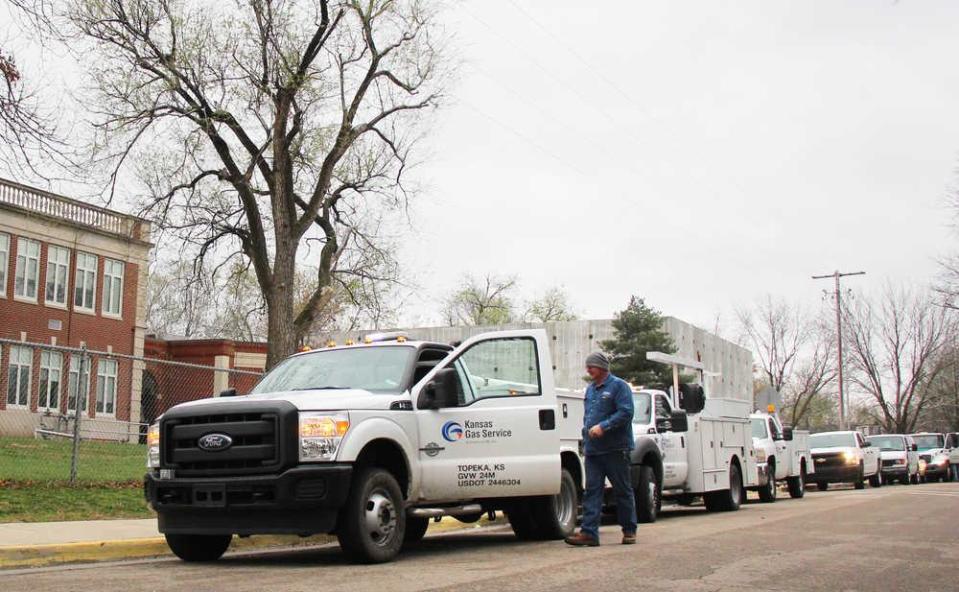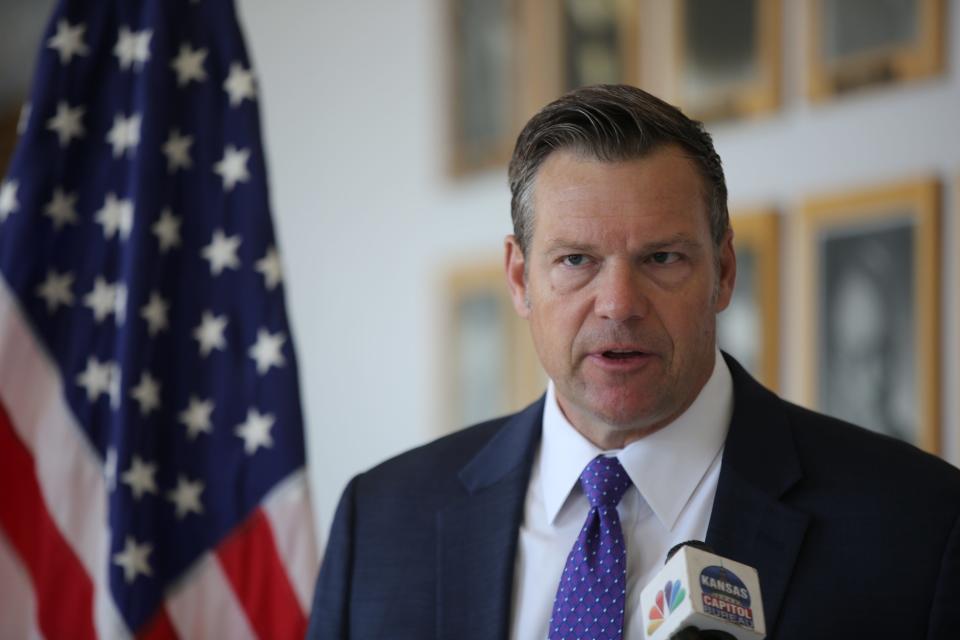You're paying extra on your utility bills. Kansas price gouging cases could change that.
- Oops!Something went wrong.Please try again later.
Kansas utility customers are paying extra on their monthly gas and electric bills, and Attorney General Kris Kobach is confident he can help the energy monopolies return some of the money to ratepayers.
"I'm very confident we'll be able to get money back for Kansans," Kobach told reporters last week. "I think our position is very strong."
The attorney general's office is suing Macquarie Energy, accusing the natural gas middleman of $50 million worth of market manipulation. The lawsuits are tied to an ongoing price gouging investigation.
Following is what to know.
Kansas is alleging natural gas price gouging
Winter Storm Uri in February 2021 increased demand for natural gas while decreasing the supply of it. Gov. Laura Kelly declared an emergency, triggering the state's law against profiteering from a disaster.
Prices spiked to $622.78 per unit, up from $2.54 per unit, and the attorney general's office has been investigating whether price gouging contributed to the 24,419% increase.
The investigation is ongoing and has resulted in two lawsuits against Macquarie Energy, alleging the company's actions caused more than $50 million in excess costs for Kansans.
Why it matters: Kansans are paying extra every month

To recoup the costs from the winter storm, the Kansas Corporation Commission has authorized gas and electric utilities to charge customers extra on their monthly energy bills.
For Kansas Gas Service customers, that means footing the $366 million bill with an extra $5.64 per month for 10 years. At Evergy Kansas Central, that means a $135 million total, or an extra $2.82 a month for two years for the average residential customer.
Payments to Evergy started in April.
"It's a fuel related charge as a result of some of the higher fuel costs that we incurred back actually in 2021 during Winter Storm Uri," Darrin Ives, vice president of regulatory affairs at Evergy, said at public hearing in Topeka in July. "The customers have started paying for it in 2023."
Other companies have also made similar deferred cost deals with the state's utility regulator.
When — and if — the price gouging investigation and lawsuits recover any money, the utilities must pass along the funds to ratepayers.
"You've probably read some articles about the AG's office in Kansas hiring legal firms to evaluate how to pursue costs from parties that profited during that time frame," Ives said. "To my understanding, all those processes are still being undertaken with state AG office and folks pursuing that, so nothing that's come in on that yet."
More: Why did Kris Kobach end contract with Florida law firm probing price gouging in Kansas?
Kansas is going up against Macquarie Energy

Kansas has alleged that Macquarie Energy, one of the nation's largest natural gas suppliers, illegally manipulated the market. Macquarie Energy is the North American subsidiary of an Australian company.
The company is being represented by former U.S. attorney for Kansas Stephen McAllister, who previously was the state's solicitor general and now works for Dentons. The company is also represented by Susman Godfrey, a prominent litigation firm, and international law firm Baker Botts.
The main lawsuit is in U.S. District Court, where Macquarie and Kobach's office have argued over whether Judge Daniel Crabtree should grant the defendant's motion to dismiss the case.
A second lawsuit is ongoing in Shawnee County District Court where the two sides have argued over whether Judge Thomas Luedke should quash a subpoena or limit it.
More: What will happen to natural gas price-gouging investigation under new attorney general?
Investigation is ongoing and could identify more targets
Court records show the attorney general's price gouging investigation remains open and that additional defendants could be sued, but Macquarie is objecting to certain information requests from the state's consumer protection attorneys.
The future of the investigation may hinge on the Shawnee County case where the attorney general's office has been fighting since November to force Macquarie to comply with a subpoena issued last August.
"At this stage of the investigation, it is clear the detailed and specific requests by the Plaintiff are intended to reveal the actions of not only this Defendant, but potentially others who influenced the price of natural gas in Kansas," Kobach's office wrote in June.
The investigation has produced tens of thousands of documents through subpoenas of other entities, including buyers and sellers in the natural gas marketplace.
While Macquarie has turned over at least 5,000 pages of documents, "many, if not most, of the records are redacted to the point of worthlessness," state attorneys wrote. The the heavy redactions have "hindered and slowed" the investigation.
For some subpoenaed documents, Macquarie provided partial responses. For others, such as communications about gas trades during the storm, the company provided nothing. Macquarie maintains that the requests are too broad and seek irrelevant information.
The attorney general's office is also seeking information on prices and volumes for gas transactions and the company's profits off the price spikes during the winter storm.
"Defendant is resisting or outright refusing to provide any material information about its transactions or finances immediately before, during, and after the storm," Kobach's office wrote. "Such information is the cornerstone of any price manipulation investigation and without such information, Plaintiff is effectively blocked from investigating the causes of the price spike, whether by Defendant's actions or by the actions of other market participants."
More: How Kansas AG Kris Kobach's effort to stir competition for gouging lawsuits led to one bid
Macquarie in July asked the Shawnee County District Court to quash the subpoena, or at least modify it.
McAllister said the attorney general's argument in support of the subpoena "relies on vague theories" and "pure speculation" while referring to the investigation as a "fishing expedition." He said that just because there were high prices during the winter storm doesn't mean Macquarie manipulated the market.
"Again, complying with these requests would entail the production of virtually all of Macquarie's highly confidential, proprietary trading information for multiple states, as well as confidential information of third parties," he wrote. "The Attorney General has proffered not a single fact in support of why this information's relevance could possibly warrant such an outcome."
Kansas hired, then fired, outside counsel

Kansas had hired it its own outside counsel with Morgan & Morgan, the country's largest injury law firm, bringing in more resources and expertise in natural gas markets and relevant law. Unlike with other major cases, the attorney general's office does not have the assistance of attorneys general from other states.
Former Attorney General Derek Schmidt hired Morgan & Morgan in 2021, and the law firm did the heavy lifting of the investigation and early stages of litigation until Kobach decided to fire the law firm a couple months after being sworn into office.
Firing of Morgan & Morgan has been contentious
Kobach has said he ended the contract with Morgan & Morgan because of performance concerns.
But the law firm has disputed that, the termination was not for cause and a public records request did not produce any record of Kobach's office ever raising performance concerns with Morgan & Morgan.
A top attorney and the law firm's founder, who is a Democratic donor, have alleged political motivations, which Kobach has denied.
The contentiousness was on display in an email exchange where Kobach's office and the law firm argued over whether the firm had turned over all the documents it was legally obligated to and whether the state owes any money to the firm. The firm threatened a $2.8 million attorney's lien against the state, and Kobach's chief adviser has indicated the firm may sue the state.
"The termination has not been amicable, and I don't want to prejudice the state's position in any litigation that may result from it," said Dan Burrows, chief deputy attorney general.
More: Kris Kobach to rebid contract after canceling deal with law firm that donated to Democrats
Kobach's office needed delays after firing law firm

Kobach previously said at a news conference, where he touted the Macquarie lawsuit and other actions in his first 100 days in office, that "it is absolutely important that the attorney general's office be ready to step forward and protect the rights of Kansans against price gouging and against fraud."
But Kobach's office was not ready to pick up the slack after he fired Morgan & Morgan and instead asked state and federal judges for extensions to their filing deadlines.
Staff attorneys said that without outside counsel, they were not "sufficiently competent in oil and gas law, the interstate natural gas market, and related regulatory and legal matters." In the federal case, the judge granted an extension while writing that "Kansas created its own predicament here."
"Its appropriate to infer that sophisticated lawyers like those leading the Attorney General's office must have known the breakup would create a problem for a lawsuit as complex as this one," Crabtree wrote.
Meanwhile, Burrows reassured lawmakers this spring: "Right now, I think we are handling it just fine. … The early stages of litigation are relatively light."
The resulting delays added about a month of waiting to the state case and about two months to the federal case.
More: Kris Kobach's firing of law firm delayed cases and prompted threats of lien against Kansas
Kobach has not yet hired new counsel
The attorney general has been trying to hire new outside counsel. Burrows told legislators that "we lack the in-house resources to handle litigation of this magnitude."
Only one law firm, Hilgers Graben, bid to represent Kobach. The firm's founders include Mike Hilgers, the Republican attorney general of Nebraska, and his wife.
Bidding on the request for proposals closed June 22. More than a month later, no contract was in place before the attorney general's office had to meet their federal filing deadline at the end of last week.
"The delay in getting replacement council is because of the process our state has as far as you have to jump through some hoops in order to hire — and jumping through hoops is probably not the right metaphor — but you have to meet certain criteria in offering the bid out to different counsel," Kobach said at the start of last week.
"We're right on the cusp of moving forward," he added. "Courts routinely have a situation where counsel is changed in the middle of a case, so we don't anticipate that being a problem."
Editor's note: This story has been updated to more accurately reflect Macquarie's objections to subpoenaed information.
Jason Alatidd is a statehouse reporter for the Topeka Capital-Journal. He can be reached by email at jtidd@gannett.com. Follow him on Twitter @Jason_Alatidd.
This article originally appeared on Topeka Capital-Journal: What to know on Kansas natural gas price gouging case, utility bills

